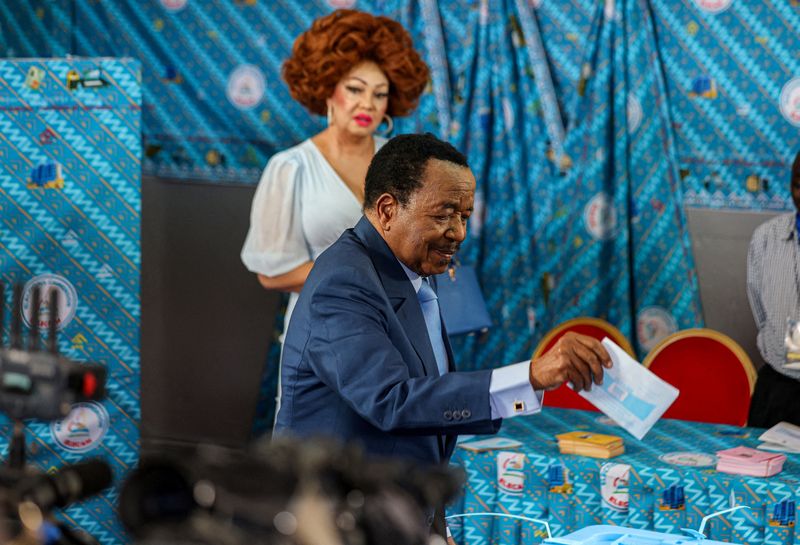Cameroon’s 92-Year-Old Paul Biya Eyes Eighth Term in Tense Presidential Election Amid Calls for Change
As dawn breaks over Yaoundé’s bustling markets, millions of Cameroonians line up at polling stations on this crisp October Sunday, casting ballots that could cement 92-year-old Paul Biya’s iron-fisted rule for another seven years—or spark the seismic shift the nation craves. The world’s oldest sitting president, in power since 1982, is gunning for an unprecedented eighth term in a single-round vote that’s as much about survival as sovereignty, with opposition voices drowned out by a fractured field and whispers of electoral sleight-of-hand.
Polls swung open at 8 a.m. local time across Cameroon’s 10 regions, from the Anglophone Northwest’s restive hills to the cocoa-rich Southwest, under the watchful eye of over 8 million eligible voters—half under 20, many knowing no leader but Biya. The incumbent, representing the ruling Cameroon People’s Democratic Movement (CPDM), faces 12 challengers, including ex-allies turned foes like 79-year-old Issa Tchiroma Bakary, his former communications minister who defected in a blaze of anti-corruption rhetoric, and 78-year-old Bello Bouba Maigari, Biya’s first prime minister from 1982. Yet the real drama unfolded pre-vote: Top rival Maurice Kamto, who snagged 18% in 2018’s disputed race, was barred by Elections Cameroon (Elecam) for his party’s 2020 boycott, a ruling the Constitutional Council upheld despite cries of bias. Other contenders, like anti-graft lawyer Akere Muna and Cabral Libii of the Cameroon Party for National Reconciliation, echo Kamto’s reform pleas but lack unified punch.
Biya’s saga is Cameroon’s modern history etched in longevity and controversy. Seizing the throne from mentor Ahmadou Ahidjo amid a 1984 coup scare, he scrapped term limits in 2008 via referendum, paving his path to landslides: 78% in 2018, per official tallies decried as rigged by Human Rights Watch. Health rumors swirl eternally—his 42-day 2024 vanishing act fueled “pure fantasy” denials from Yaoundé—yet Biya, often sunning in Europe, vows “the best is yet to come,” pledging economic fixes, youth jobs, and poverty punches in a July X post that lit up his campaign. His lone rally in far-north Maroua drew throngs waving “Paul Forever” banners, but absenteeism defines him: Day-to-day reins rest with family and CPDM brass, including wife Chantal, amid graft probes that snag underlings but spare the top.
The ballot’s barren of heavy hitters, amplifying fraud fears. Elecam, slammed as CPDM-puppet by foes, greenlit Biya despite age-bid petitions from Muna citing “recurrent health absences and presumed dependency.” No runoffs mean plurality rules—Biya’s machine, blending patronage and intimidation, historically nets 70% plus. Violence shadows the show: Anglophone separatists, raging since 2016 over perceived marginalization, vow boycotts and clashes that killed 6,500 per UN tallies; Boko Haram kidnaps in the north claim dozens yearly. In Bamenda, Tchiroma pledged separatist releases; Douala streets buzz with youth decrying “scam” polls.
Analysts paint a grim canvas. Oxford Economics’ Francois Conradie pegs Biya’s win at “formidable electoral machine” odds, despite opposition splinters. Reuters notes Tchiroma’s rallies pulling thousands—a “spirited challenge”—but fragmented rivals boost the septuagenarian’s edge. Even kin rebels: Daughter Brenda Biya’s September TikTok blast—”he’s made too many suffer”—racked viral disdain before her recant, underscoring elite cracks. On X, #BiyaMustGo surges with 100,000 posts, memes of his Geneva jaunts clashing CPDM’s “Stability Now” spam; youth in Yaoundé chant for Kamto, barred but boycotting.
For Americans, this Cameroon presidential election drama reverberates far beyond the Gulf of Guinea, threading U.S. security, commerce, and conscience. Economically, Biya’s oil-cocoa powerhouse—Africa’s most diversified—feeds $2 billion in yearly U.S. imports, but corruption siphons 20% of GDP, per World Bank, inflating global cocoa prices that hike Hershey bars and EV batteries amid supply snarls. Politically, it spotlights U.S. Africa Command’s counter-Boko Haram ops, with 300 troops in Chad eyeing Cameroon’s jihadist bleed—escalation risks taxpayer billions, echoing Sahel pullouts. Technologically, stalled reforms hobble Camtel’s 5G rollout, bottlenecking U.S. firms like Cisco in a $1 trillion Afri-digital boom. Lifestyle ties hit home: Diaspora Cameroonians, 100,000 strong in Maryland-New York enclaves, remit $500 million yearly, strained by homeland inflation at 6% and 40% youth joblessness—mirroring U.S. immigrant tales of divided loyalties.
Sports fans feel the Anglophone quake: Crumbling pitches in Bamenda sideline soccer talents eyeing MLS dreams, while U.S.-backed peace pacts falter. User intent screams for hope amid despair—voters hunt blueprints for equity, not eternity; expats seek visa-safe updates on post-poll stability. Managing the melee demands Elecam transparency: Verified tallies due in 15 days, but past probes (like 2018’s ghost votes) breed skepticism.
As urns seal at 6 p.m., Biya’s bid to rule till 99 tests Cameroon’s soul—will his machine mint another mandate, or will youth fury fracture the facade? With separatist shadows lengthening and opposition embers glowing, this vote isn’t just Cameroon’s crossroads; it’s a global gauge of longevity’s limits in a restless world. The counts will tell, but the cries already echo.
By Sam Michael
Follow us and subscribe for push notifications to stay ahead of breaking African politics and global election stories—your voice amplifies the call for change.
Cameroon presidential election 2025, Paul Biya eighth term, world’s oldest president election, Biya re-election bid, Maurice Kamto barred Cameroon, Issa Tchiroma Bakary challenge, Cameroon opposition divided, Anglophone crisis election impact, Biya health rumors 2025, African democracy Paul Biya
